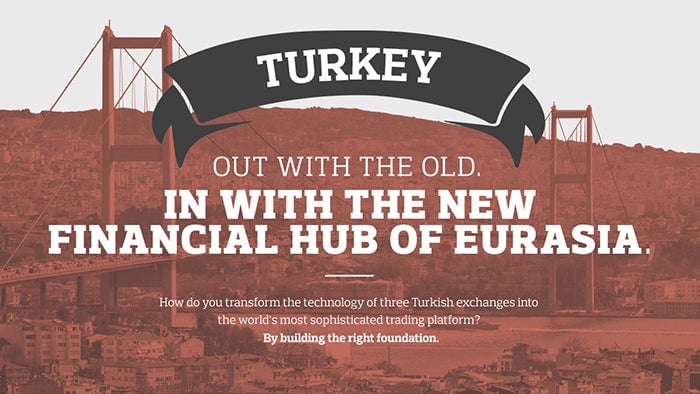Why Turkey is the new financial hub of Eurasia
Compared to other European countries, Turkey is a high growth economy. Following an economic crisis in 2001, an IMF program of financial and fiscal reforms put the country back on track quickly, and the economy grew more than 6% annually through 2008. Thanks to the well-regulated financial markets and banking system, the country was barely affected by the recent global economic crisis. GDP grew by about 8.8% in 2011, 2.2% in 2012, and 3.8% in 2013.


Compared to other European countries, Turkey is a high growth economy. Following an economic crisis in 2001, an IMF program of financial and fiscal reforms put the country back on track quickly, and the economy grew more than 6% annually through 2008. Thanks to the well-regulated financial markets and banking system, the country was barely affected by the recent global economic crisis. GDP grew by about 8.8% in 2011, 2.2% in 2012, and 3.8% in 2013.
Turkey has a strong workforce, which is essential to future growth. The population was expected to increase to 81.6 million by mid-2014. The median age is just under 30, and 42.3% of the population is under the age of 25. The main industries are agriculture, textiles, and clothing. Yet the economy is now more diversified as the automotive, construction, electronics, and oil & gas sectors have become more important.
Against this backdrop, the government has put considerable effort into turning Istanbul into a financial hub and creating a strong capital market. It has made significant changes, including the introduction of new laws to increase transparency and protect investors. Three small exchanges were merged into one holding company, Borsa Istanbul (BIST).

(Click on image to view full infographic)
BIST’s goal is to be a leading, integrated, multi-asset class exchange that operates a best-of-breed platform serving issuers, investors, and traders globally. In 2013, the exchange launched the “Listing İstanbul” program to attract more foreign companies. It signed Memoranda of Understanding with Tirana Stock Exchange, the International Islamic Financial Market, the Karachi Stock Exchange, and most recently the Kazakhstan Stock Exchange; became a shareholder of Montenegro Stock Exchange; and signed a strategic partnership with Nasdaq.
On the new products side, the exchange signed a cooperation agreement with Ethical Investment Research Services Ltd. to create the BIST Sustainability Index, and it started calculating the BIST SME Industrial Index. It was also authorized to disseminate Sarajevo Stock Exchange data locally and abroad.
In technology, the BIST Derivatives Market (VIOP) merged its trading platform with the Turkish Derivatives Exchange (TURKDEX), and all futures and options contracts started trading under the same platform at VIOP. In addition, it implemented a FIX application and EX API terminals for transmitting orders to the equity market trading system.
As its technology partner and advisor, Nasdaq is helping to overhaul the trading, clearing, market surveillance, and risk management systems, and transform the market by attracting liquidity and implementing international standards and best practices.
One of BIST’s strengths is that it’s geographically and culturally positioned to attract business from both Europe and the Middle East. By harnessing its people and technology platforms, it can reap the best of both worlds.
If you would like to receive alerts when new BULLETIN installments are published, sign up here.
This article was produced by Nasdaq and not by the Quartz editorial staff.